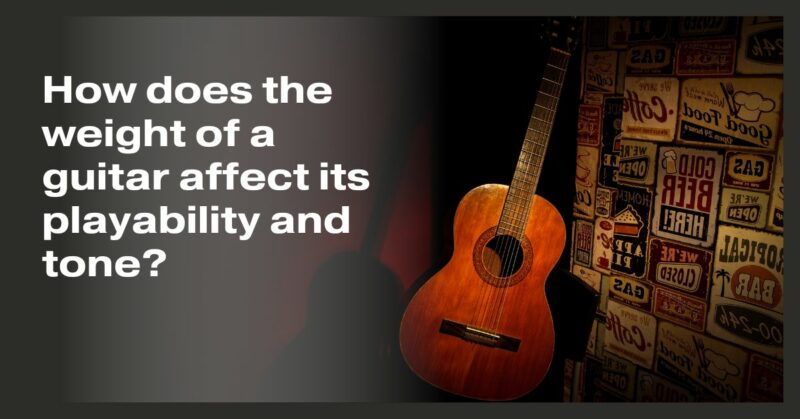The world of guitars is as diverse as the music it produces, and one often overlooked aspect is the guitar’s weight. The weight of a guitar can significantly impact both playability and tone, shaping the overall playing experience and sound. In this article, we’ll explore the relationship between guitar weight and its effects on playability and tone, helping you understand how this factor can influence your musical journey.
Playability and Guitar Weight:
The playability of a guitar refers to how comfortable and easy it is to play, and weight plays a substantial role in this aspect. Here’s how guitar weight influences playability:
1. Comfort and Ergonomics:
- Lighter guitars are generally more comfortable to hold for extended periods, making them a preferred choice for long gigs or practice sessions.
- Heavier guitars can cause discomfort during extended playing, leading to fatigue and potential strain on the player’s neck and shoulders.
2. Balance:
- The distribution of weight across the guitar’s body affects its balance. A well-balanced guitar, whether light or heavy, feels more comfortable to play, allowing the player to focus on their music without distraction.
3. Body Size and Shape:
- The size and shape of the guitar body can impact how its weight is distributed. Smaller, compact guitars may feel lighter due to their reduced size, even if they have a similar overall weight.
Tone and Guitar Weight:
The weight of a guitar can also have a substantial influence on its tone. Here’s how guitar weight affects the instrument’s sound:
1. Sustain and Resonance:
- Heavier guitars tend to offer better sustain and resonance. The added mass allows the strings to vibrate more freely, resulting in longer sustain and richer tones.
- Lighter guitars may have shorter sustain but can produce brighter, crisper tones.
2. Brightness vs. Warmth:
- Heavier guitars tend to produce warmer and fuller tones with more pronounced low-end frequencies. They are often favored for styles like blues, jazz, and classic rock.
- Lighter guitars tend to have a brighter and more cutting tone, making them suitable for genres like country, pop, and certain styles of rock.
3. Acoustic vs. Electric:
- In acoustic guitars, weight is primarily determined by the wood used in construction. Heavier woods, like mahogany, contribute to a warm, rich tone, while lighter woods, like spruce, produce a brighter, crisper sound.
- In electric guitars, body material, such as solid mahogany or lightweight alder, can significantly impact the guitar’s overall weight and tonal characteristics.
Finding the Right Balance:
Ultimately, the ideal guitar weight is a matter of personal preference and playing style. Here are some tips for finding the right balance:
- Try Before You Buy: Whenever possible, try out different guitars to get a feel for their weight and how they suit your playing style.
- Consider Your Playing Style: Think about the genres you primarily play and whether a warmer or brighter tone is more suitable for your music.
- Evaluate Your Physical Comfort: If you plan on long practice sessions or live performances, consider the comfort of the guitar in terms of weight and balance.
- Customization: Some guitars allow for customization of components, including the body material and hardware. This can provide a level of control over the guitar’s weight and tone.
Conclusion: A Balanced Approach
The weight of a guitar is not a one-size-fits-all factor. It’s a nuanced aspect that can significantly impact playability and tone. As a player, understanding how guitar weight influences your music and comfort is essential. Whether you prefer the warmth of a heavy mahogany body or the brightness of a lightweight alder, finding the right balance ensures that your guitar becomes an extension of your musical expression.

